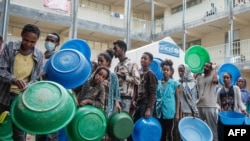Millions of people in Ethiopia continue to face acute food insecurity and extreme hunger as a direct result of conflict. Even in times of peace, people in the hardest-hit areas would have needed food aid due to three years of severe drought and inadequate harvests.
However, the fighting between federal and regional forces and the Tigray People’s Liberation Front, or TPLF, has exacerbated an already bad situation into a humanitarian disaster. According to the United Nations, over 90 percent of Tigray’s 5.5 million people are in dire need of food aid.
That’s why the United States is encouraged that the government of Ethiopia and regional authorities in Tigray and Afar have taken steps in recent weeks that have laid the groundwork for an end to conflict and enabled the delivery of desperately needed food aid to war-affected communities.
For example, Ethiopian Prime Minister Abiy Ahmed lifted the state of emergency, released some political prisoners and detainees, and, in parallel with Tigrayan authorities, declared a cessation of hostilities. Tigrayan forces, meanwhile, have withdrawn most of their forces from Afar and have reiterated their commitment to a peaceful resolution of the conflict.
Nevertheless, Secretary of State Antony Blinken urged the parties “to accelerate, uphold, and expand these efforts to ensure, as President Biden has said, immediate, sustained, and unimpeded humanitarian access to all Ethiopians affected by this conflict.” He added, “We now urge the parties. ... to seize the opportunity to advance a negotiated ceasefire, including the necessary security arrangements, and call for the restoration of essential services in Tigray on an urgent basis.”
The United States stands ready to continue to assist in this life-saving endeavor and remains committed to a unified, prosperous, and sovereign Ethiopia and to supporting an inclusive political process to heal the country’s divisions and provide peace and security for all Ethiopians.






